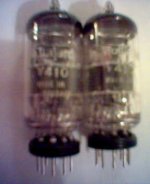I have a pair of Mullard CV4109 (I think). I was looking for ECC88 tubes for my AN DAC 2.1X Balanced and my dealer recommended these. He claims they are the best he has heard (he's quite reliable and honest). The tubes actually only show the remaining words "Mullard V410 Made in Britain" in white. It also has the words "SJO R7H3" which I believe from the Phiilips code means SJ = CV4109 and R stands for Mullard, 7 could mean 1957 or 1967 and H3 = Aug 3rd week. Most curiously, the pins (very short) coming out from the glass bottom is soldered onto a seperate socket with the std 9 steel pins. Its like a standoff.
Question: Is this a 6922 or 7308 and does anyone has data sheet for it.
Anyway, has anyone heard of this tube and what do you think of it. Appreciate any inputs.
Question: Is this a 6922 or 7308 and does anyone has data sheet for it.
Anyway, has anyone heard of this tube and what do you think of it. Appreciate any inputs.
Attachments
fdegrove,
Thanks for the reply. The tubes do have the wording Mullard on them. I suppose you mean that these are Brimar branded as Mullards. I though its usually the other way around. Would really like to know if its an E88CC/6922 or an E188CC/7308. I intend to use it in a DAC which has current regulation for the heaters and its now set for 6922
Thanks for the reply. The tubes do have the wording Mullard on them. I suppose you mean that these are Brimar branded as Mullards. I though its usually the other way around. Would really like to know if its an E88CC/6922 or an E188CC/7308. I intend to use it in a DAC which has current regulation for the heaters and its now set for 6922
Hi,
What I meant was that, to the best of my knowledge, the only manufacturer making this odd construction was Brimar.
The socket you have on it is probably solder on afterwards as these tubes were solde with long lead out wires just like a pencil/subminiature tube.
I'll continue looking for the exact reference as I'm certain I've seen a pic like that on the web.
Only, I'm sure it was an ECC type, not sure it was an ECC88 equivalent though.
Either way, I very much doubt your tube is an equivalent of the E188CC/7308 as those were developped really late like the Seventies or thereabout.
Cheers,
What I meant was that, to the best of my knowledge, the only manufacturer making this odd construction was Brimar.
The socket you have on it is probably solder on afterwards as these tubes were solde with long lead out wires just like a pencil/subminiature tube.
I'll continue looking for the exact reference as I'm certain I've seen a pic like that on the web.
Only, I'm sure it was an ECC type, not sure it was an ECC88 equivalent though.
Either way, I very much doubt your tube is an equivalent of the E188CC/7308 as those were developped really late like the Seventies or thereabout.
Cheers,
- Status
- This old topic is closed. If you want to reopen this topic, contact a moderator using the "Report Post" button.
